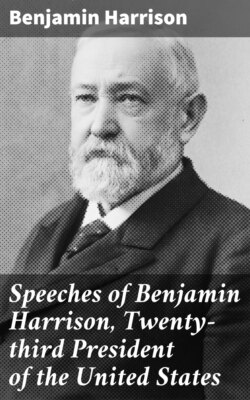Читать книгу Speeches of Benjamin Harrison, Twenty-third President of the United States - Benjamin Harrison - Страница 4
На сайте Литреса книга снята с продажи.
BIOGRAPHICAL.
ОглавлениеTable of Contents
Benjamin Harrison, twenty-third President of the United States, was born Tuesday, August 20, 1833, at North Bend, Hamilton County, Ohio. He is the second son of the late John Scott and Elizabeth Irwin Harrison.
His father—the third son of President William Henry Harrison and Anna Symmes—was born at Vincennes, Indiana, was twice elected to Congress as a Democrat, from the Cincinnati district, and died in 1878.
General William Henry Harrison, ninth President of the United States, was the third son of a famous signer of the Declaration of Independence—Benjamin Harrison, of Virginia, and his wife Elizabeth Bassett. This Benjamin Harrison, "the signer," was one of the first seven delegates from Virginia to the Continental Congress. He reported the resolution for independence, was Speaker of the House of Burgesses, and was thrice elected Governor of Virginia, dying in 1791; he was the eldest son of Benjamin and Anna Carter Harrison, both of whom were descended from ancestors distinguished for their high character and their services to the colony of Virginia.
Ben Harrison's boyhood was passed upon his father's farm in Ohio. At the age of 14, with his elder brother Irwin, he attended Farmer's College at Cincinnati, preparatory to entering Miami University at Oxford, Ohio, from which institution he graduated in 1852.
He studied law in the office of Judge Belamy Storer at Cincinnati, and in March, 1854—with his bride, Miss Caroline W. Scott, to whom he was wedded October 20, 1853—he located at Indianapolis and began the practice of the law.
In 1860 he was elected reporter of the decisions of the Supreme Court of Indiana, as a Republican, receiving 9,688 majority.
In July, 1862, he was commissioned by Gov. Oliver P. Morton as second lieutenant, and raised Company A of the Seventieth Indiana Volunteer Infantry, was commissioned captain, and on the organization of the regiment was commissioned colonel. In August his regiment entered the field and became a part of the 1st Brigade of the 1st Division of the 20th Army Corps, Gen. W. T. Ward, of Kentucky, brigade commander. At the battle of Resaca, Sunday, May 15, 1864, the Seventieth Regiment led the brigade in a gallant charge, and its colonel signally distinguished himself, being among the first to scale the bloody parapet. He actively participated in the engagements at Cassville, New Hope Church, Gilgal Church, Kulps Hill, and Kenesaw. Following that great captain in the Atlanta campaign, initiatory to his famous march to the sea, Colonel Harrison at the battle of Peach Tree Creek, July 20, 1864, in the crisis of the fight, without awaiting orders, seized an important position and successfully resisted, at great loss, the terrific assaults of a large detachment of Hood's army. For this brilliant achievement, upon the recommendation of Major-General Joe Hooker, he was brevetted in March, 1865, by President Lincoln, a brigadier-general, to date from January 23, 1865.
In October, 1864, while at the front, he was re-elected, by 19,713 majority, reporter of the Supreme Court, which office he had lost by accepting a commission in the army. After four years as reporter he resumed his law practice, forming a partnership with Albert G. Porter and W. P. Fishback. About 1870 Mr. Fishback retired, and the firm became Porter, Harrison & Hines; upon Governor Porter's retirement W. H. H. Miller took his place, and in 1883 Mr. Hines retired, and, John B. Elam coming in, the firm became Harrison, Miller & Elam.
In 1876 Hon. Godlove S. Orth was nominated as Republican candidate for Governor of Indiana, but pending the canvass he unexpectedly withdrew. In this emergency, during General Harrison's absence on a trip to Lake Superior, the Central Committee substituted his name at the head of the ticket. Undertaking the canvass despite adverse conditions, he was defeated by Hon. James D. Williams—"Blue Jeans"—by a plurality of 5,084 votes.
In 1878 he was chosen chairman of the Republican State Convention.
In 1879 he was appointed by President Hayes a member of the Mississippi River Commission.
In 1880 he was chairman of the delegation from Indiana to the National Convention, and with his colleagues cast 34 consecutive ballots for James G. Blaine in that historic contest.
President Garfield tendered him any position but one in his Cabinet, but the high honor was declined.
In January, 1881, he was elected United States Senator—the unanimous choice of his party—to succeed Joseph E. McDonald, and served six years to March 3, 1887.
In 1884 he again represented his State as delegate at large to the National Convention.
January, 1887, he was a second time the unanimous choice of his party for United States Senator, but after a protracted and exciting contest was defeated on the sixteenth joint ballot, upon party lines, by 2 majority.
June 25, 1888, he was nominated at Chicago by the Republican National Convention for President, on the eighth ballot, receiving 544 votes against 118 for John Sherman, 100 for Russell A. Alger, and 59 for Walter Q. Gresham. He was chosen President by 233 electoral votes against 168 for Grover Cleveland. The popular vote resulted: 5,536,242 (48.63 per cent.) for the Democratic ticket, 5,440,708 (47.83 per cent.) for the Republican ticket, 246,876 (2.16 per cent.) for the Prohibition, 146,836 (1.27 per cent.) for the Union Labor, and 7,777 (0.11 per cent.) scattering.
